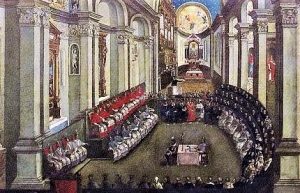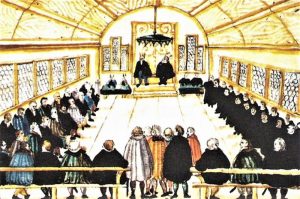Saint Augustine of Hippo
In Christian church history there are representative characters who have served as an example of honest life and their efforts in the study of Christianity and its moral philosophy. Saint Augustine of Hippo is one of these great figures of Christianity, recognized by the Catholic, Orthodox, Protestant and Eastern churches as the "Doctor of Grace" or "Doctor of the Christian Church" thanks to his valuable contributions in philosophy and theology.

Personal information
- Born: 13/11/354
- Birthplace: Tagaste, Algeria
- When he died: 28/08/430
- Where did he die: Hippone, Algeria
Who was Saint Augustine of Hippo?
Saint Augustine of Hippo was the most prominent thinker of Christianity and medieval philosophy until the 13th century. He is considered a saint, bishop, doctor of the Catholic Church and creator of the philosophical foundations of Christianity. In his life, Saint Augustine was a very prolific author, creating a great number of works with diverse themes. He is venerated by the Catholic Church, the Orthodox Church, the Protestant Church and the Oriental Churches, which celebrate their day on the 28th of August each
Biography of Saint Augustine of Hippo
Saint Augustine of Hippo was born on November 13, 354 in Tagaste (now Algeria), a town in North Africa. His father was called Patricio and was of violent temperament unlike his mother Monica, who baptized him months before his father died.
Saint Augustine’s mother, Monica was recognized as St. Monica years later. She took care of raising Augustine, his brothers and sisters.
As a child, Augustine was admitted to the catechumenate and was always a seeker of truth. In his adolescence, he studied the philosophical currents before becoming part of the church.
Between the years 373 and 382, Saint Augustine of Hippo followed several philosophical currents such as epicureism, Manichaeism, skepticism and Platonism but never remained attached to the ideas of these, returning in the year 383 to Christianity again thanks to the teachings of the bishop of St. Ambrose of Milan.
In the year 391, Augustine was ordained as a priest and consecrated as bishop of Hippo in the year 395.
In the year 410, heresy threatens the Christian church and Saint Augustine of Hippo begins his theological battle, fighting the Manichean heresy, the Donatists and Pelagians. His written production related to classical Greek philosophy, Christianity and other subjects was very abundant generating Augustinian theories that formed part of the Catholic and Protestant theology of Christianity.
August 28th, in the year 430, Agustin died in Hippo, in the hands of the vandals of Genseric, who subdued the city of Hippo, which belonged to a Roman province of Africa.
Years later, Augustine’s body was sent to Sardinia and later to Pavia, Italy, in 725 to the basilica of San Pietro in Cield’Oro where it remains today.
Philosophical thinking
The philosophical thought of Saint Augustine of Hippo is influenced by Platonic philosophy, which has much presence in his Christian philosophy.
According to Saint Augustine, man tends to happiness by nature and can only attain it through God, to be happy he needs reason and faith, as well as his intelligence and will.
For Saint Augustine, man is composed of body and soul. The body is formed by the four elements and the soul is endowed with memory, appetite and cognitive faculties. Likewise, man plays an important role in the history created by God in which there is a constant struggle between the earthly city, generated by selfish love, and the eternal city founded on Christian charity. According to Saint Augustine, this struggle will be won in the end by the city of God.
Contributions
The works of Saint Augustine were of great importance throughout the Middle Ages and in the Modern Era, especially in philosophical and theological areas.
At present, the works of Saint Augustine are studied and discussed in depth in many schools of philosophy and theology of the world because of their richness in content and their way of understanding and explaining man, God and the nature of many things.
Confessions of Saint Augustine of Hippo
One of the most significant works of Saint Augustine of Hippo is called “Confessions“, which is made up of a series of thirteen autobiographical books of the Saint, written between the years 397 and 398.
Ethics
The ethic of Saint Augustine of Hippo is religious because it is centered on God and the Happiness that comes from meeting him. It is also described as an ethic of love because this is the will that leads man to God, and it is only love that liberates man and brings him closer to the Creator.
Saint Augustine considers bad morals to be a distancing from God and causes man to turn away from good by doing bad deeds.
Like other Fathers of the Church, Saint Augustine believes that social ethics should punish the injustices of wealth and promote solidarity with the disadvantaged.
Works of Saint Augustine of Hippo
Saint Augustine was a character of numerous and admirable works. Among the main writings of this distinguished doctor of the church, the following can be mentioned:
Philosophical writings
- Happy life.
- Order.
- Against academics.
- Free will.
- The dimension of the soul.
- The teacher.
- Nature and origin of the soul.
- Nature of good.
Writings in defense of the faith
- True religion.
- The customs of the Church and those of the Manicheans.
- Manual of faith hope and charity.
- Letter to Catholics on the Donationist Sect (The Unity of the Church).
- Faith in what we do not see.
- Usefulness of faith.
- The Trinity.
- The city of God
Writings on divine freedom and the freedom of man.
- Treatises on grace.
- The spirit and the letter.
- Nature and grace.
- The grace of Jesus Christ and the original sin.
- Grace and free will.
- Correction and grace.
- Predestination of the saints.
- The gift of perseverance.
- Diverse questions to Simpliciano.
- Consequences and forgiveness of sins, and baptism of children.
- Reply to the two letters of the Pelagians.
- The minutes of the trial to Pelagio.
- The perfection of man’s justice.
- Marriage and concupiscence.
- Replica to Juliano (unfinished work).
- 396 Sermons to the People of God.
- 1-50: On the Old Testament.
- 51-116: On the synoptic gospels.
- 117-183: On the Gospel of St. John, Acts and Letters of the Apostles.
- 184-272 B: On liturgical times.
- 273-338: On the martyrs.
- 339-396: On various themes.
Writings on moral issues
- The goodness of marriage.
- Holy virginity.
- The goodness of widowhood.
- Continence.
- Adulterous unions.
- Patience.
- Christian combat.
- Lying.
- Against lies.
- The work of monks.
- The Sermon on the Mount.
- Exhortation and Meditation Writings.
Biblical Writings
- Treatises on the Gospel of St. John.
- Commentaries on the psalms.
- The Christian doctrine.
- Commentary on Genesis in reply to the Manichaeans.
- Literal commentary on Genesis (incomplete).
- Literal commentary on Genesis.
- Exposition of some texts of the Letter to the Romans.
- Initiated exposition of the Letter to the Romans.
- Exhibition of the Letter to the Galatians.
- Treatises on the First Letter of Saint John.
- Seventeen passages from the Gospel of St. Matthew.
- Expressions of the Pentateuch.
- Mirror of Sacred Scripture.
- Eight Old Testament questions.
- Questions about the Heptateuch.
- Annotations to the book of Job.
- Concordance of the evangelists.
Writings on evil and man’s creation
- Man’s two souls.
- Minutes of the debate against the mannequin Fortunato.
- Reply to Adimanto, disciple of Manes.
- Reply to the letter of Manes, called “of the Foundation”.
- Minutes of the debate with the mannequin Felix.
- Response to the Secondary Mannequin.
- Reply to Faust, the Manichaean.
- Psalm against the sect of Donato.
- Reply to Parmenion’s letter.
- Treatise on baptism.
- Summary of the debate with the Donatists.
- Reply to Petilian’s letters.
- The only baptism ( Reply to Petilian).
- Message to the Donatists after the debate.
- Sermon to the faithful of the Church of Caesarea.
- Letter to Catholics on the Donationist Sect (The Unity of the Church).
- Reply to the grammarian Cresconio, Donatist.
- Minutes of the debate with Donatist Emerito.
- Replica to Gaudencio, Bishop Donatist.
- The heresies dedicated to Quodvultdeo.
- Sermon of the Arians.
- Reply to the sermon of the Arians.
- Debate with Maximino, Arian bishop.
- Reply to Maximino himself, Ariano.
- To Orosio, against the Priscilianists and originists.
- He replied to the adversary of the Law and the Prophets.
- Treatise against the Jews.
Other writings
- The immortality of the soul.
- Music.
- Faith and the Symbol of the Apostles.
- Catechesis for beginners.
- Faith and works.
- Sermon on Christian discipline.
- Sermon to the catechumens on the Symbol of the Apostles.
- Eighty-three different questions.
- The diabolic divination.
- Answer to Dulcicio’s eight questions.
- Piety with the deceased.
- The usefulness of fasting.
- The devastation of Rome.
- Rule to the servants of God.
- The Revisions.
- Catalogue of the books, treatises and letters of Saint Augustine, edited by St. Posidius.
- Faith, a book dedicated to Peter.
- The spirit and the soul.
- The love to God.
- Manual of spiritual elevation.
- The Paradise Ladder.
- Combat between vices and virtues.
Phrases of Saint Augustine of Hippo
Of the many famous phrases quoted by Saint Augustine of Hippo, the following can be mentioned.
- “When we pray, we speak to God, but when we read it is God who speaks to us.
- “The measure of love is to love without measure.”
- “Know thyself, accept thyself, overcome thyself.”
- “He who is not jealous is not in love.”
- “There was no time when there was no time.”
- “Once a year it is lawful to do crazy things.”
- “It is one thing to have walked more and another, to have walked more slowly.”
- “If we are drawn to Christ, we believe unwittingly; then violence is used, not freedom.
- “If you need a hand, remember that I have two.”
- “If I doubt, if I hallucinate, I live. If I deceive myself, I exist. How can I deceive myself by asserting that I exist, if I have to exist to deceive myself?”
How to cite this article?
Briceño V., Gabriela. (2019). Saint Augustine of Hippo. Recovered on 23 February, 2024, de Euston96: https://www.euston96.com/en/saint-augustine-of-hippo/









